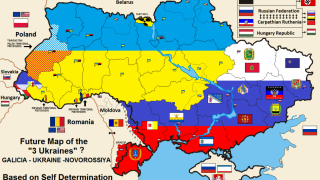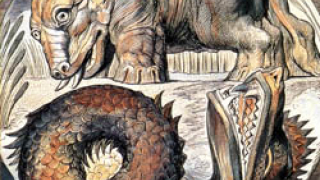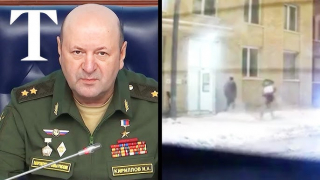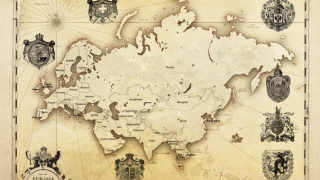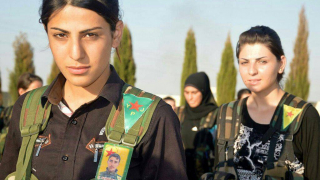INTERVIEW WITH HIS ROYAL HIGHNESS PRINCE VLADIMIR KARADJORDJEVIC
His Royal Highness Prince Vladimir Karadjordjevic is a member of the Serbian dynasty. HRH is a son of Prince Andrej Karadjordjevic and grandson of HRH King Aleksandar I Karadjordjevic. His grandmother was Her Imperial Highness Maria Kirilovna the Grand Duchess of Russia. Prince Vladimir lives with his wife Princess Brigitta in North-Rhine Vestphalia in Germany, and his positions were always very patriotic as well as sympathetic towards Russia and Eurasia. Prince Vladimir was kind enough to give an interview for Katehon explaining his positions about society, politics and geopolitics.
Your Royal Highness, could you please tell us something about your Russian ancestry – your grandmother was HIH Grand Duchess Maria of Russia?
Yes, the mother of my mother Kira Melita of Leinengen, was Maria Kirilovna the Grand Duchess of Russia. She was the eldest daughter of Grand Duke Kiril Vladimirovich of Russia and Grand Duchess Victoria Fedorovna. She was born in Coburg, Germany and with her family returned to Russia just before the World War I. Unfortunately, after the 1917. Revolution, they were forced to leave the country once again. She was raised in Coburg and in Saint Briac in France. Her father, Grand Duke Kiril, followed a career in the Russian navy serving during twenty years in the Naval Guards. He took part in the Russo - Japanese war, barely surviving the sinking of the battleship Petropavlovsk at Port Arthur in April 1904. During World War I, Grand Duke Kiril was appointed Commander of the Naval Depot of the Guards in 1915 and in 1916, he achieved the rank of rear Admiral in the Imperial Navy. With the execution of his cousins Tsar Nicholas II and Grand Duke Michael, Grand Duke Kiril took the position of the Headship of the Imperial Family of Russia and, as next in line to the throne, the Guardian of the Throne in 1924. HIH Grand Duke Kiril was proclaimed the emperor in exile in 1926. He worked for the restoration of the monarchy from exile for the rest of his life.
Was your Russian blood line perhaps a motivation for you to become interested in the Russian Empire legacy and traditions?
Definitely! I would be free to use the metaphor that the Russian blood in my veins was always present and boiling. In the sense, that not that only that I always had an interest for the Russian legacy, but my choices and affinities were often conditioned by this heritage of mine. I always knew what my identity and position vis a vis Russia was.
Could you please give us your observation and understanding of the historical as well as spiritual and cultural ties between Serbia and Russia?
It is a very complex question and not even a single book would be sufficient to depict all the aspects of the connection between Russia and Serbia. This is a profound and multi-layer connection and could be analyzed from various aspects – spiritual, cultural, historical, political, geopolitical or geostrategic… But the synergy of all these aspects might be found in one definition -
Russia and Serbia are not two peoples living in two separate states, but rather two subdivisions of one people. Everything brings us towards this definition
– our same Orthodox Christianity, our almost similar culture and language, our same political positions, our military alliances in all past conflicts, even the "world" ones, our same geopolitical and geostrategic interests. And as something that forges the ties between these previously mentioned things – an intensive emotional relation and love between Russians and Serbs throughout the entire history. If we explain the relation between Russians and Serbs by this definition – everything becomes very clear and simple. And all rhetorical and demagogic maneuvers opposite to it collapse in a blink of the eye.
The Karadjordjevic family directly supported and hosted the enormous population of White emigrants who came to Serbia (Kingdom of Yugoslavia) after the end of civil war in Russia under Baron Pyotr Wrangel. The ties between Serbia and Russia were even more forged at that time – could you please give us a comment on this?
I cannot hide my immense honour and pride in saying that, through my late grandfather, King Aleksandar I, my family was personally involved in giving refuge and hosting an enormous population of Russians which arrived in Serbia (Kingdom of Yugoslavia) during and after the civil war in Russia, which further forged not only the friendship between Serbian and Russian people, but also, on a more personal level, between my family and the Russian people. Baron Pyotr Wrangel was hosted by our Kingdom, which was ruled by my grandfather, and was allowed to enter Serbia in 1921 with his troops, under full arms and flags. His troops were hosted and greeted with the highest military and civilian honours, as brothers and not as immigrants… Before this and after defeats in which he lost half his standing army, and facing defeat in Northern Tavria and the Crimea, Wrangel organized a mass evacuation on the shores of the Black Sea. Wrangel gave every officer, soldier, and civilian a free choice: evacuate and go with him into the unknown, or remain in Russia and face the wrath of the Red Army. Wrangel evacuated the White forces from the Crimea in 1920 in the remnants of the Russian Imperial Navy, that became known as Wrangel's fleet. The last military and civilian personnel left Russia with Wrangel on board the General Kornilov on November 14, 1920. Initially, Wrangel lived on his yacht Lucullus at Constantinople, which was rammed and sunk by the Italian steamer Adria, which had sailed from Soviet-held Batum. Wrangel, who was on shore at the time, was not killed in what was widely regarded as an assassination attempt.
Wrangel then journeyed with his staff via Turkey and Tunisia to the Kingdom of Serbs, Croats and Slovenes as the head of all Russian refugees, and arguably became the most prominent of all exiled White emigres. In 1924, in Belgrade, he established the Russian All-Military Union (POBC -Русский Обще-Воинский Союз) , an organization established to fight for the preservation and unity of all White forces living abroad. He moved from Serbia to Brussels, Belgium from September 1927. due to certain health problems, and worked as a mining engineer. In the years that followed the events of an important Russian population relocating to Serbia, our country has flourished in many various fields due to this influx of experts and many historians define this period as Serbian renaissance.
Baron Wrangel himself died suddenly in 1928. I am amongst those who strongly believe that he was killed by a Soviet agent, the brother of his household helper. Although Baron Wrangel's funeral and burial initially took place in Brussels, it was his very personal wish to be buried where “his heart remained” – in Serbia. In October 1929, this was done! Baron Wrangel was reinterred in the Russian Holy Trinity Church in Belgrade near Tasmajdan park in the city center. In this sense, we can say that his role is in a way symbolic and spiritual. Baron Wrangel is on his last guard in Belgrade, facing the eternity.
What is your understanding on the present global geopolitical situation – we are witnessing a strong antagonism between the western (Atlanticistic) and Russian (Eurasianist) geopolitical and political positions?
I believe that the antagonism between the West, i.e. – Atlantist, Atlanticistic civilization on one side, and Eurasian, Eurasianist on the other, is more intensive than ever before. When one steps back and analyses the complete picture it is not difficult to conclude that the reason for this "intensifying" is the circumstance that the Atlantists are losing their grounds.
It would very much appear to be the case that the only Russia, as the hinge and basis of Eurasia, which is acceptable to the Western liberal world, is a weak Russia, which is hoped would be easy to control. Let's say, the Russia from the period of two decades ago...
Contrary to this, today’s Russia as a strong and serious power, not only in military sense, but also in sense of politics, geopolitics, identity, axiology paradigms, does not correspond to the very apparent Atlantistic ambition of absolute global control. Therefore, the West is becoming very uneasy, perhaps even neurotic, if we follow much of the recent and present rhetoric from some in the "West". In every sense, this is very dangerous. The vital and viral Russia of President Vladimir Putin which regained its natural position and “space” of an imperial power, is continuously demonized by the West. Whilst to many this maybe nothing new, the rapid and volumetric intensification of this demonizing of Russia has hit an all time high in recent years. To this end I would have to say that we are already witnessing certain important changes within the Atlanticistic zone, which could very well be interpreted as a beginning of its decomposition or, at least, its redefinition – Brexit, Donald Trump as President of the USA, etc…
Could you please give us your comment on the position of Serbia in this antagonistic context?
I would say that Serbia is acting in a reactive and not proactive way. Its political elites are always late. They are not acting on the basis of the actual political and geopolitical processes or processes which are ahead, but remain in the situation which is already over. This is the case with their almost schizophrenic dualist “sitting on two chairs” – the EU (instrument of Atlanticism) and Russia (center of Eurasia). It seems that they do not have enough political maturity and consciousness to analyze the current global processes – the EU is in the state of decomposition and crisis, the USA after the last elections will surely redefine its foreign policy, Russia is strong and luckily becoming even stronger, the liberalism itself is in crisis and is likely to implode. At the same time, from the historical point of view, as well as from the point of view of identity – Serbia and Russia are similar. There is no antagonism between Serbian and Russian identity (spiritual, cultural) and their political, geopolitical, geostrategic interests. The Eurasian context is something where Serbia belongs in a natural and organic sense. And the “razor blade” game which Serbian political elites are playing between our antagonists – the Atlanticists, and our natural and historical allies – Eurasianists, becomes very hard to understand.
What is your opinion what would be the Serbian polical and geoplolitical long term interests from the point of view of its historical inheritance as well as its identity?
I believe that I have just replied to this question in my previous answer. In one short line – Serbia’s interest is to remain in harmony with its identity. This is very difficult as a part of the Atlanticistic civilization for the reason of their opposite political, cultural, spiritual (anti-spiritual), geopolitical and geostrategic interests compared to ours. If it wants to become a part of the Atlanticistic civilization, Serbia has to act in an auto-chauvinistic and masochistic way. It has to cripple itself, in a metaphoric way. It has to act against its own interests. Contrary to this, as a part of a zone in which Russia leads this question, this moment it being the Eurasian zone, Serbia would surely preserve and develop its organic interest and identity. Please do not misunderstand me - I am not talking about severing of all or any friendships but much more about the inherent dangers to Serbia, of being "led" by the wrong influences, rather than being aided by those who share the very same "genetic" values!
We are witnessing the intense and turbulent changes related to the political, even ideological setting in the global political context (Brexit, Trump in the USA, Russian international influence, etc.) – could you please give us your comment on this?
If we analyze these phenomena from the broader perspective, we could conclude that these are not merely separate and random events, but rather the various symptoms of a crisis of one civilization.
It seems that the Atlanticistic society is going through a deep and serious crisis, and if we are not afraid of giving more fatalist qualifications – maybe even facing its end.
The crisis that I am talking about does not refer only to politics, but spreads to economy (neoliberalism is falling apart), culture (we are facing the symptoms of a terminal phase of one civilization model through the modernism and post-modernism), thought (cultural Marxism in its various forms), axiology (the values and paradigms of liberal societies which are lowered to the most vulgar individualism, hedonism and consumerism). At the same time, these phenomena like Brexit and the election of the new president in the US are giving hope and space for action to the bearers of some other model of society and different paradigms, social as well as individual. We might offer something to these people in their shallow post-civilization. As a conclusion of this, I would say that we are living in the period of the shift from liberal to the post-liberal era. Those who are aware of this and are prepared for this turbulent period might be the new torches of civilization.
How do you see the present migrant crisis in the Middle East and Europe?
It is important to be aware that this cannot be a spontaneous or random process. It must be the result of a plan, or part of a plan, and it has certain circles that are its initiators, as well as some circles which profit of it. There is a strange synergy of interests between the neoliberal huge capital circles (and their political instruments – the political elites in the EU) which have the idea of importing cheap labour force (as well as to have the mechanism of keeping the salaries low), and a multitude of "powers" in the USA, which would like to keep the crisis close to the Russian borders. The USA is gradually losing its ground in the Middle East (Turkey after the coup, Russian military cooperation with Iran and its bases in Syria), once serious US and NATO threat to the south of Russia is no longer so serious. Therefore – the possible scenario is to bring the “explosive element” north-west, which might destabilize Europe close to the Russian borders. To those "powers" I mentioned just now, it is important to have the potentially explosive and destructive capacity near Russia. The catastrophic consequence of this process would be the destruction of the European spiritual, cultural and national identities. The very real chaos is ahead of all of us due to this uncontrolled process.
What is your position about Eurasianism as a politican and geopolitical theory? Do You personally have some special understanding of Eurasianism?
Eurasianism is a theory which I personally find very close to my personal understandings of society and geopolitics. Together with the works of one older author – Konstantin Leontiev. In this context, it is important to mention that the classical Eurasianism (of Prince Nikolai Trubetzkoi, P.N. Savitski, .P. Suvchinski, D. S. Mirski, P. Arapov, Florovski) had many sub-theories and even different approaches. Some of its variations were developed among some of the Russian emigration during the 1920’s in Serbia (yet some were opposed to this theory).
I support the Eurasianist understanding of geopolitics, especially since in all its forms and shapes it is based on Russia as its hinge and basis.
And Russia is a traditional ally of Serbia. Personally I think that the main difference between the Russian classical (and modern) interpretation of Eurasianism and the Serbian one is the understanding of the Muslim element. While the Muslims were the subjects of the Russian Empire, Serbs were the subjects of a Muslim Empire – the Ottoman one. And the relation with Islam for centuries defined our understanding of our own, Serbian identity. The relation of Russians towards Islam in this point is quite different compared to the Serbian one. Our opposition to Islam defined our identity. Contrary to this, Russia, along the centuries, tried to find the most efficient modus operandi to secure the loyalty of the Muslim element. For this reason, our understanding of Eurasianism is based more on the Byzantine contents and on understanding Russia as the inheritor of Byzantium, the only legitimate Empire. On Moscow as the third Rome… And in this context, I would propose to develop further the neo-Byzantium as a concrete geopolitical concept which would be an element of Eurasianism. And would refer to the states and nations which were a part or under influence of the Byzantine Empire, especially the Orthodox Balkan states.
You have recently become a leader and a patron of the Sovereign Military Order of the Dragon, a traditionalist, pan-monarchist and Eurasianist organization in Serbia. You have also intensified your presence in Serbia through your cabinet. What are your plans for the future?
After the passing away of the founder and leader of the Sovereign Military Order of the Dragon, HRH Prince Aleksandar in May 2016, I accepted to become the new patron of this organization. The organization continues in the same direction in which it functioned before and in accordance with its platform – traditionalism, pan monarchism and Eurasianism. Its methodology is, conditionally speaking, meta-political, in sense that it does not function as a political party or political group, but all its projects have strong impact related to the Serbian society. The idea is to reconstruct the elements of tradition (in the Evolian sense of this notion) within the Serbian society from “below” and not from “above”. The idea is based more on “de facto” and less on “de jure”. The idea about my cabinet in Serbia is in intensifying my presence in the state. It represents, again conditionally, the “more political” approach, but again with keeping the dynasty above the realpolitik. And, as before, my idea is to serve to the Serbian people and not to rule. I always kept in mind what I have learned from my father and my ancestors – my relation with the people should never be based on the command: “Advance!”, but always on: “Follow me!”.
Source: Katehon.com





